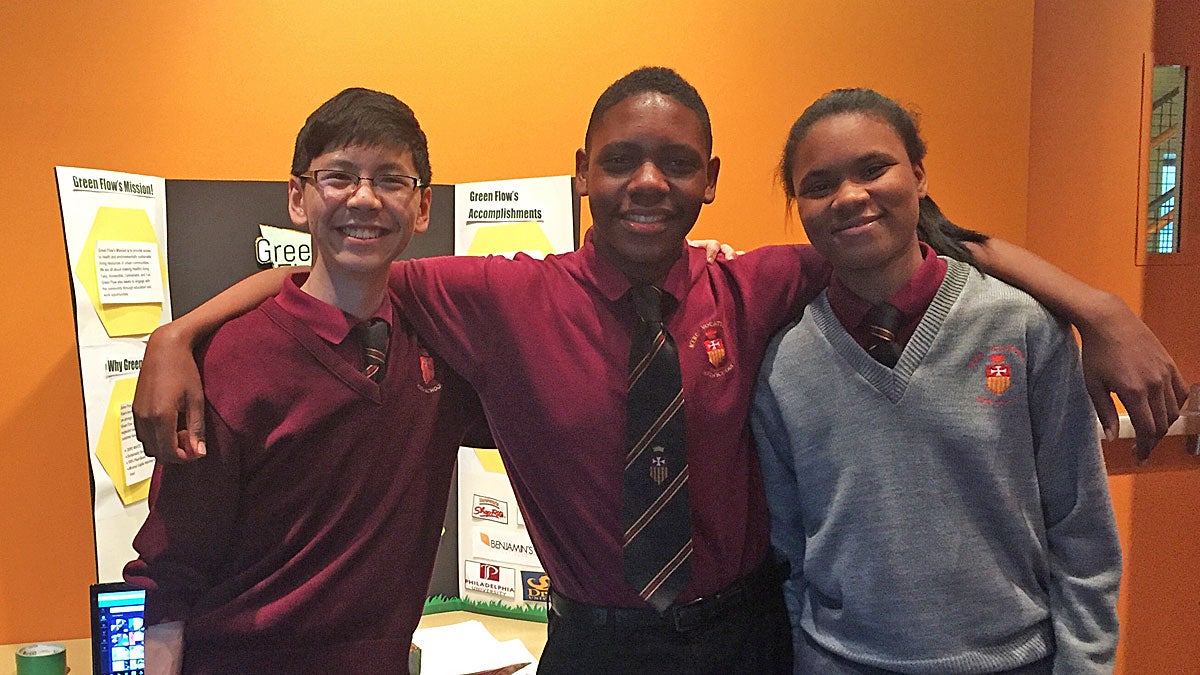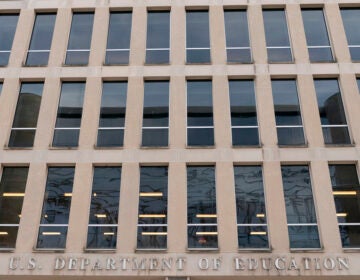At Catholic high school in North Philly, passion projects take center stage

Students at the 2017 IMPACT Philly Final Showcase. (Avi Wolfman-Arent/WHYY)
Mary “Betty” Edwards loved the hair bows her granddaughter, Gabby, used to wear as part of her cheerleading outfits.
“I’m not a real girly girl,” said Gabby, a junior at Mercy Career Technical High School in North Philadelphia. “So it was crazy to see me wearing a cheerleading bow in my hair.”
Betty might have liked to wear a bow of her own, but her cancer treatments wouldn’t allow it. Through chemotherapy and radiation treatments, Edwards lost her hair and eventually her life in the summer before Gabby’s sophomore year.
“My grandmother was like my best friend,” said Gabby.
To honor her, Gabby teamed with a trio of classmates to create “Bows for Betty,” a fledgling organization that sells decorative hair bows and donates the proceeds to Fox Chase Cancer Center, where Betty received her treatment.
“Bows for Betty” is one of nine passion projects presented Friday at Mercy’s second annual IMPACT Philly final showcase.
For a year, students in the school’s business program dream up solutions — big and small — to societal problems. The primary requirement is that they have a genuine interest in the subject.
The students then put together plans using design thinking, a problem-solving framework that emphasizes substantive initial conversations with the people one is trying to help.
Mercy CTE, a vocational and technical school run by the Sisters of Mercy, places strong emphasis on project-based learning. That basic idea is that kids learn best when they get really invested trying to solve a big problem they genuinely want to solve. Months of worksheets cede the way to months chipping away at a large, multi-phase project.
Sometimes those projects birth business plans with sprawling ambition
Green Flow, a combined creation of juniors Chase Kelsey, Shadira Russell, and Tho Tran, aspires to deliver fresh produce and pre-arranged meals a la Blue Apron, but to source most of its ingredients from gardens and urban farms within Philadelphia. Plus, it wants the cutlery and packaging to be biodegradable. Plus, it wants to distribute educational materials on healthy eating in high-poverty areas.
Russell, a native of North Philly, was drawn to the project partly because of her own eating habits. On nights when her mom doesn’t cook, Russell likes to stop by one of the many corner stores in her neighborhood.
“You’ll still feel hungry for more after even though you just had a whole meal,” Russell said.
Her teammate, Chase Kelsey, interjects.
“Sorry, if could just add,” he said. “One really big thing with fillers and things like that — so we’re eating foods that are high calorie and low nutrient. They’re still gonna leave you hungry because, though you feel full and fat, your body’s still starving of everything that it needs.”
Kelsey is a fountain of knowledge on sustainability, urban agriculture, and healthy eating. While working on the Green Flow project he became a vegan because it’s “the most sustainable diet option.”
Almost all the students have some personal tie to their projects. Breanna Gallagher’s mom has a close friend in the Navy, which inspired her group to create “reverse care packages” for children whose parents are deployed overseas.
Robert Davis wants to organize an anti-violence rally at City Hall to honor a friend killed by stray gunfire in the sixth grade.
For Zachary White, the very process of completing a project was therapeutic.
Last year, White participated in another group project, but, by his own admission, barely contributed. When it came time for the final presentation in May, he was able to do little more than click through the slideshow as his teammates presented.
“I didn’t even say a word,” he said in a soft, but deliberate tone. “I was scared crapless. I was scared of even talking because I was scared I might mess up.”
This year, White went solo and created an autism awareness campaign aimed at younger students. His goal was to educate students so that they don’t bully students with autism, sparing future generations from some of the abuse he endured in middle school. When it came time to present, White did the entire pitch himself.
As he closed, White offered a short reflection.
“In all honesty this is one of the best things, if not the best project, I’ve ever done,” he said.
“If any other teacher gives me the opportunity to say it again, I’d do it in a heartbeat.”
He paused a full five seconds–perhaps for drama or perhaps to revel in the accomplishment. And then he finished with a simple “Thank you.”
WHYY is your source for fact-based, in-depth journalism and information. As a nonprofit organization, we rely on financial support from readers like you. Please give today.





